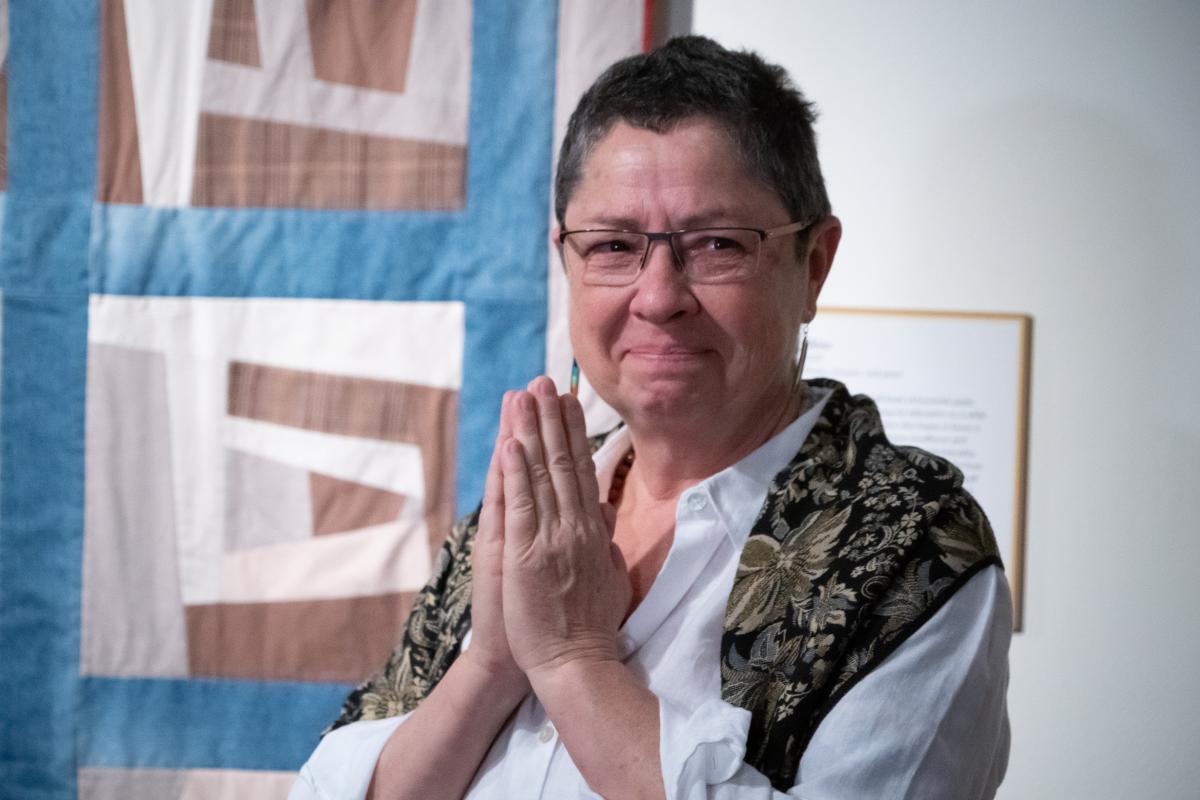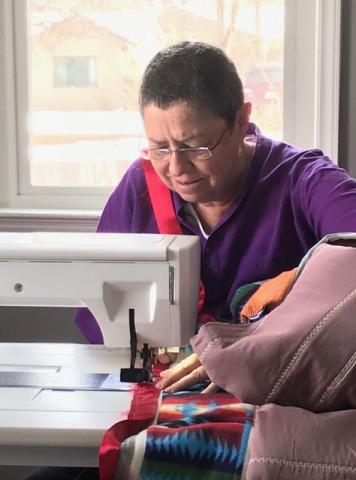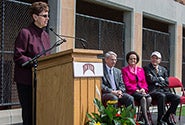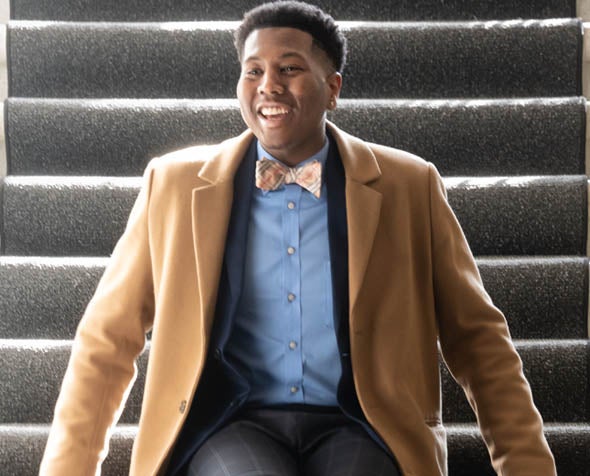“Happy to be gay”: Celebrating Pride Month with Sister Fred

Frederique Chevillot, better known to the DU community as Sister Fred, remembers her first day as an assistant professor of French (now French and Francophone Studies) in what was then the University of Denver’s Department of Foreign Languages and Literatures quite well. It was Sept. 4, 1990, and instead of teaching class, she gave birth to her first daughter.
Of course, she eventually did get the first day she had expected and has since become an institution around the DU campus. Over the last 30 years, Sister Fred earned tenure, directed the Women’s Studies program, reformed that very program into the Gender and Women’s Studies program, served on the Faculty Senate, became involved with Undergraduate Council, helped implement DU’s first-year seminar initiative, chaired over a hundred doctoral dissertation defenses, and ushered students into a new chapter as a Commencement marshal — among other contributions.
Eight years ago, Sister Fred came out — first and foremost to herself — and happily joined DU’s strong LGBTQ + community. In celebration of Pride Month, she shared via email a bit about her time at DU, how she observes pride and the important role quilting has played in her life.
Having seen the University through a number of graduating classes, chancellors and changes, what shifts have you noticed in terms of the way DU supports and reaches its LGBTQ+ community members?
That’s a very interesting question, because it was only recently — about eight years ago — that I myself came out of my own closet. I can certainly attest to the fact that, in my narrow experience at the time, sexual orientation on campus was always positively acknowledged and somewhat protected. I remember when domestic partnership was officially recognized on campus and DU employees could share their benefits with their life partners. I remember feeling that this was a cool big deal. I think that I sort of took for granted that LGBTQ+ folks would be OK on campus. I now realize that it was a naive and limited way of perceiving things. I did not realize then, as I do know, that rules and regulations “on the books” never go far enough. We all still have a lot of work to do at the levels of our personal daily assumptions. Also, back then, if the more progressive among all of us could understand gays and lesbians and even bisexuals, we certainly were a long way from opening up to the needs and wishes of trans or intersex individuals. “Queer” was a word that brought everyone together into a same category when we did not dare fully acknowledge different and unique identities. I do believe that DU has come a long way. Programs were created, and there are some spaces available for LGBTQ+ communities to gather and share and make their voices heard. We still have work to do to make all of us actually hear and support our many diverse voices, and I want to be optimistic that we are on our way to getting there.
Your research and teaching focus on French and Francophone writers. In what ways do your academic interests intersect with your identity?
Although my research and teaching are focused on contemporary French and Francophone women writers, I cannot say that I am studying lesbian or queer writers in particular. I have, however, always been interested in the ways in which anyone, in contemporary literature written in French, is perceived as being “the other” by the normative powers that be. My protagonists of predilection will be the poor, the rejected, the female, the rebellious ones, the migrant ones, the exiles, the lost souls, the weird, the perceived-as-mad, the LGTBQ+ in or out of the closets.
Your recent work also specifically looks at sex, love and compassion among French women writers. Do you have any short stories or novels around this topic you can recommend for those looking to celebrate Pride Month?
The texts I study are not always readily available in English, unfortunately, but I can certainly recommend any publication by authors such as Nina Bouraoui, Nicole Brossard, Hélène Cixous, Christiane Rochefort or Monique Wittig.
Around campus, you’re known as Sister Fred. Can you share with us how you became Sister Fred?
I became Sister Fred about 15 years ago. It is my name as a quilter. I took one single introduction-to-quilting class when my daughters were about 6 and 9. They had had a lady come to their school to teach them how to stitch by hand an appliqué on a nine-square mini-quilt. I was intrigued. I signed up for the class, and I was hooked. Instead of buying fabrics — as I have always found too difficult to choose from because there are so many available — I became particularly eager to bring together people’s clothes into a quilt. Of course, I started with my daughters’ outgrown outfits, then my own old clothes, then my friends’. That thing took a life of its own. As my quilts were leaving me, I needed to sign them, and I felt that my first name was too long and not very interesting as a signature. In French, my nickname is Fred, but in English, “Fred” did not bring forward my being a woman, and a proud one at that. I have always believed in sisterhood — as in Robin Morgan’s now classic book from 1970, “Sister is Powerful.” I figured “Sister Fred” was pretty powerful as well. In January 2019, Christina Kreps from the DU anthropology department made it possible to exhibit some of my quilts in the Museum of Anthropology gallery. I guess that’s when I officially came out as Dr. Sister Fred on campus.
Tell us about why you are drawn to quilting and what it means to you.
Quilting together people’s clothes is terribly meaningful to me. Life scatters, life hurts and separates. When I make a quilt, I have the impression of stitching together different aspects of someone’s life — different pieces of the puzzling puzzles that our lives are and, perhaps, that our clothes, outfits, garments reveal and hide at the same time. I have had the sad and humble honor to bring together the clothes of beautiful folks that passed away. It is a grave responsibility to cut into the clothes of those who have transitioned to bring them together into a quilt that will be cherished by the loved ones left behind. It becomes a strangely comforting and sacred object that warms up the body and the soul. I am humbled and honored beyond words to be the one who passes it on.
Given COVID-19 restrictions, Pride Month is looking different this year, and the celebration is primarily virtual. How do you plan to recognize this month?
To me, Pride Month is to be celebrated every month of the year, COVID-19 or not. Today is a particularly difficult period of time for all of us. I celebrate Pride Month — and pride — year-round by being grateful and acknowledging my own often-undeserved blessings by being compassionate toward others, online and in the grocery store, and by cultivating my small vegetable garden in all senses of the term. I am delighted the Supreme Court recently ruled in favor of gay and transgender rights in the workplace. That is great cause for celebration.










